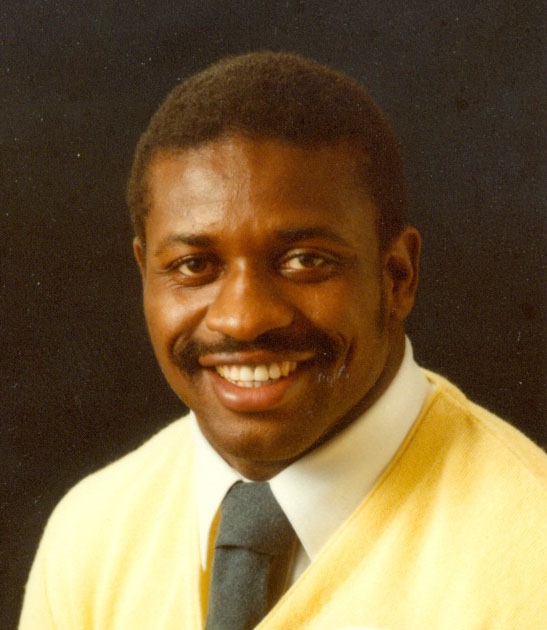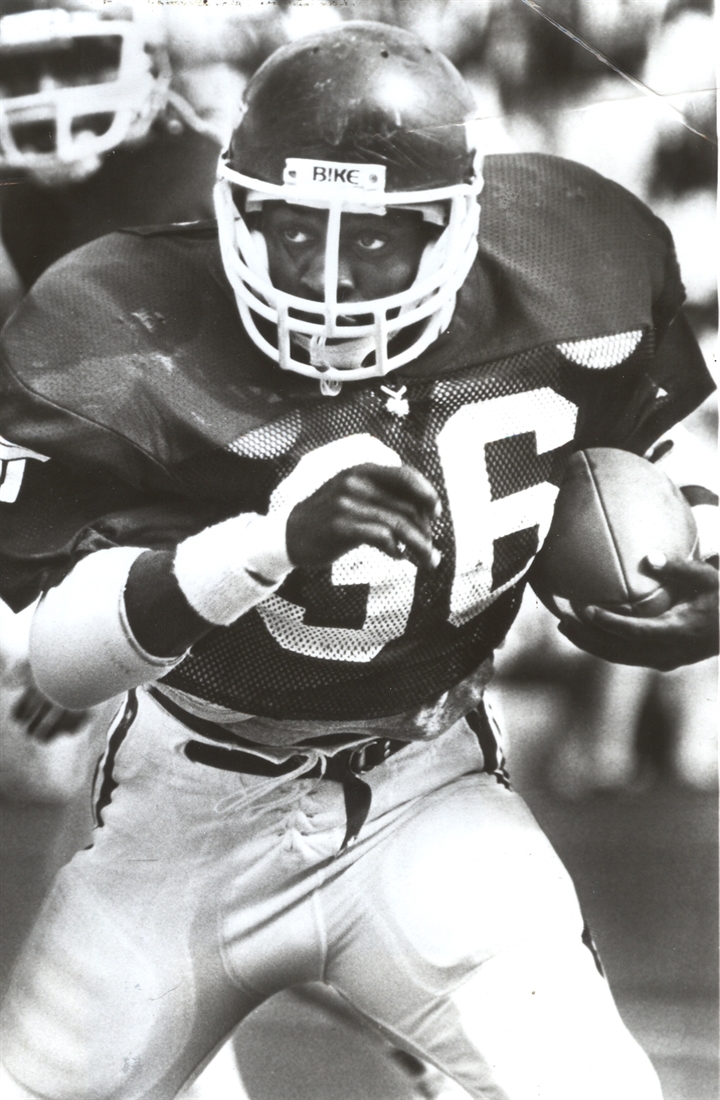In a world littered with selfies, Snapchat stories and Instagram videos, one simple solitary picture might no longer be worth those one thousand words. But don’t try telling Kenneth Davis that theory. Because the picture that graced the 26th issue of Dave Campbell’s Texas Football back in the summer of 1985 represents a lifetime of words and emotions.
“Man, that was a good day,” recalls Kenneth Davis, the dashing young running back sharing a well-deserved smile with his coach Jim Wacker under the banner of the “bible” of Texas Football. “I’ll cherish that moment for the rest of my life and the fact that it was captured on the cover of Dave Campbell’s, well, it’s as special as playing in those four Super Bowls.”

A packed Amon G. Carter Stadium in the background, Davis and Wacker celebrate a come-from-behind victory over Texas Tech in what was one of the most meaningful wins in school history. By beating the Red Raiders, TCU set the stage the following week to host Texas in what was for the Horned Frogs the biggest game since Davey O’Brien won a national championship back in the 1930s. Sellouts were about as common in Fort Worth as Democrats, but it was standing-room only when the Longhorns came to town that next week. Unfortunately for TCU, Texas stacked the box to stop Mr. Davis and sent the capacity crowd home unfulfilled.
“Kenneth saved our bacon against Texas Tech the week before Texas by putting together one of the greatest second-half performances I’d ever seen,” remembers John Denton, then a kicker on the squad and now director of major gifts with TCU Athletics. “As the season progressed, teams definitely focused all of their attention on stopping Kenneth. Or at least slowing him down. He was our heart and soul for sure.”
Today, the heart and soul of Wacker’s veer attack shares the lessons he’s learned on and off the field with his students at Bishop Dunne, a small private Catholic high school school just south of Dallas. Davis has served for two decades as the program’s athletic director and before that was the football team’s head coach.
“I just arrived here this summer but it was obvious from the start that Kenneth Davis means the world to this school,” says Bishop Dunne principal Mary Beth Marchiony. “He’s an inspiration to anyone who comes into contact with him whether that be student, faculty or staff. He’s a massive part of our brand here at Bishop Dunne and we’re very fortunate to have him here.”
When you’ve been a marked man by defensive coordinators since high school and then college and finally for nine seasons in the NFL, you understand how to battle through adversity.
“My goal is to teach these young people the value of hard work, of course. But it’s equally important that they realize within the halls of this place, this is not the real world,” Davis says, one of 12 siblings born in tiny Bartlett, Texas. “I want them to be great students, leaders and athletes. Does the fact that I played in the NFL impress them? Well, maybe it impresses their parents! But some of the kids get a kick out of it as well. The big thing is that they listen and learn from folks who’ve been down that road already and who understands the pitfalls of being young and inexperienced.”
Davis knows plenty about making a few missteps as a young man. And he admits that he could have handled himself better. “But you live and learn and you don’t make the same mistakes twice,” he says.
After turning in an All-American season in 1984, finishing fifth in the Heisman race (Doug Flutie won the top honor that year) and setting most every school rushing record, Davis figured to be a Heisman finalist and then a first-round pick by some lucky NFL team. Instead, he spent all but one game of the ’85 season on suspension after admitting to taking money from a booster. His college career was over in a flash.
“I did and said some stuff at the time that I wished I had back. I admit that for sure,” explains Davis. “But I was young and naïve about what would happen. I learned plenty from that situation and hope I’ve been able to mentor the young folks here on making the right decisions along the way.”

Before arriving in Fort Worth, Davis was nothing short of a folk hero in Temple, Texas. The nickname given to him by then TCU sports information director Glen Stone – The Temple Tornado – rivals Hakeem “The Dream” and “Night Train” Lane in Texas sports lore.
“Playing high school football in this state is a special deal for sure. And I couldn’t have played for a better coach than Bob McQueen or played for a better town,” Davis says. “Temple is the kind of town that literally rolls up Main Street when you play out of town. In fact, they had a banner that read ‘Last one out of town turns off the lights.’
“I remember people I’d never met shaking my hand and wishing me luck during the week. I remember little kids riding their bikes waving at me like I was a celebrity. That’s Temple and that’s why playing there meant so much to all of us.”
Davis not only starred at running back, but he also was a dazzling cornerback and accomplished kicker – both punter and placekicker. In fact, he nearly won Temple a state playoff game in 1978 when his 56-yard attempt fell just a yard short of its mark. “I told Coach McQueen that I was gonna make that one. It hurt when it fell short and we lost to Plano. But that made winning it all in 1979 all the more satisfying.”
If it was the sense of community that bonded Kenneth Davis to Temple during his high school years, it was that same community bond that made this Central Texas legend right at home in frigid Buffalo, New York, years later.
“The similarities between the two towns are amazing when it comes to supporting their teams,” says Davis, who signed with Buffalo after three seasons in Green Bay. “The folks in Buffalo are a special breed. It didn’t matter how much snow we’d get or how cold it got. They showed up hours and sometimes a day before kickoff just to get ready to cheer. It was an amazing time.”
Equally amazing was the show the Bills put on during Davis’ tenure there. Four AFC titles in a row thanks in large part to an innovative wide-open fastbreak offense and a two-back attack led by Thurman Thomas and Davis. Today, two-back backfields are commonplace. In the early 1990s, the Bills’ one-two punch was rare indeed.
“Years after I retired, Coach (Marv) Levy and (General Manager) Bill Polian told me that they would field trade offers for me basically every season,” Davis says with a chuckle. “But they wouldn’t budge because of how hard I worked and how much my work helped to push Thurman. We were a great combo back there and I’m very proud of the career I put together.”
And as far as being on the losing end of four straight Super Bowls . . . “Yeah, that wasn’t as much fun as it could have been. We should have won that first one against the Giants and we had chances in the others for sure. It’s quite an accomplishment to do what we did for four straight years competing in a very good conference.”
Although Davis was Thomas’ change-up throughout his time in Buffalo the Temple Tornado did have some special moments carrying the rock. His performance against the Houston Oilers in the miracle comeback in the playoffs forever etched Davis’ name in Buffalo Bills’ history. And when Thurman misplaced his helmet on the first series against the Redskins in Super Bowl XXVI, Davis got an unexpected start.
“I always wondered how much Kenneth had to pay the Bills’ equipment man to hide Thurman’s helmet,” Denton joked.
Today, when Davis isn’t busy attending a sporting event at Bishop Dunne or tending to items around his home in Arlington, he can be found on Stadium Drive in Fort Worth involved with his alma mater. “He’s really embraced TCU and the school embraces him in a big way,” Denton says. “In fact he’ll be doing the invocation at our Hall of Fame induction ceremony this season.”
Life after football, especially when football involves playing running back, can be a tough proposition. But Davis it appears came away from those battles with just a few manageable scars. “I still work out and keep myself as fit as I can. I played every play as if it was my last play so I definitely left nothing on the field. My position coach in Buffalo Elijah Pitts always appreciated that type of effort. I now try to motivate these young people to approach every day with that same passion and excitement.”
Davis holds the vintage 1985 Dave Campbell’s snug in his hand like a Wilson football as he escorts me to the front door of Bishop Dunne at the end of our conversation. The smile on his face now echoes back to that sideline 34 years before. “Coach Wacker taught me about excitement and about living your life to its full potential. That’s what that cover means to me and I’ll never forget it.”
This article is available to our Digital Subscribers.
Click "Subscribe Now" to see a list of subscription offers.
Already a Subscriber? Sign In to access this content.
